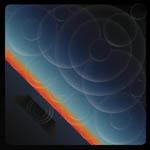
The Mars Volta Noctourniquet
(Warner Bros./Sargent House/Rodriguez-Lopez Productions)
There is something to be said for musicians testing their mettle in a rock arena, jamming out or dueling licks or simply spreading riffs across the grooves of an LP so that we, the fans, the devoted ears, the adulating epitomizers of rock n’ roll worship, can lead better, super-enriched and happy, dappy, little lives. Somewhere along the lines, this wasn’t enough for rock n’ roll. It had to get sophisticated because musicians grew with their instruments and got…well, they got sophisticated, whether you wanted them to or not.
In 2003, The Mars Volta released De-Loused in the Comatorium, an emotive answer to prog that sprung in the early point of a decade’s love affair with garage blues. The White Stripes had released the milestone album, Elephant, two months before De-Loused hit shelves, announcing to the rock world then switched on by very vintage and purposely unpolished sounds that chord progressions and compositional rock art were the absolute shit. Following the dissolution of their prior band, At The Drive-In, the songwriting team of Omar Rodríguez-López and Cedric Bixler-Zavala satisfied their lust for technical excellence and acquired a fanbase hungry for their brand of musical calisthenics.
Since elitism had made its comeback, it had only taken two years for The Mars Volta to bury its collective head up its ass and take a big whiff, 2005’s Frances The Mute the millennial-quivalent to Yes’s Tales from Topographic Oceans: One extraordinarily long, pretentious and dull interlude with barely a song to absorb. And while the garage thing lost some steam, Rodríguez-López and Bixler-Zavala continued on their merry and self-indulgent way up until 2009’s Ochtehedron, at which point it was decided balladry and pop-based experimentations would be the way to go.
2012’s Noctourniquet gets me thinking about the past. When MTV came round in 1981, bands with a legacy or some longevity within the decade prior relied solely on the quality of their performances and records. Here was this new means of promotion that required bands to shrink into very attractive and easy to digest talking heads fit for televised, mass-participatory consumption. Many a 70s band suffered the 80s badly, its unforgiving mainstream drawn to popped collars and big hair, neon and Nagel, 5 o’clock shadows and soft, (very soft), rock n’ roll. Bands that had once ripped and roared were riding the ballad train to singlesville, tried and true mode of musical transition courtesy of Chicago, Journey and Genesis. Noctourniquet breaks into a new decade, electronically embellished, startlingly edited and softened by ballads. For those of you out there that began prepping your veins for a time signature fix once news of this release swept the blogs, social media and webzines, expect a diluted batch.
Now, don’t despair: Noctourniquet finds The Mars Volta in the rare position of being cohesive, but not to the expense of what makes them unmistakably them. Consider The Whip Hand: syncopated and industrialized, a throaty synthesizer smeared across the hook. As rhythmically out of step as the song is, though, there’s little in terms of transition and the song itself is easy enough to swallow. A rumbling of drum noise leads into Aegis, which I believe to be the album’s most successful moment. The elements fall together nicely, The Mars Volta working with subtlety. Dyslexicon, with its haphazard percussion and flamboyantly expressive chorus, provides a strong follow-up and the band manages to do a lot within the span of four and a half minutes. The hyper, jazz-rhythmic psychedelic Molochwalker, with even less time, manages to satisfy the band’s prog fetish without risk of excess. Also notable is the album’s first single, The Malkin Jewel, an exploratory bit of psych rock that’s hard to dislike. It’s a standout song and a good primer for the album.
The Mars Volta has discovered economy. Even with their longest song, In Absentia, the band utilizes a rapid-percusso Richard D. James techno racket with conventional instruments. Probably the most experimental moment on the album and it’s confined to how far its concept can be taken. The song later shifts to a singular beat, but continues to utilize keyboard embellishments, which almost seem like dazzling and well-positioned synthesizer clichés. The preceding track, Lapochka, also makes use of off-kilter IDM percussion, a cleaner more machined variation that suffers next to In Absentia’s take.
The album’s other lengthy offering, a ballad titled Empty Vessels Make the Loudest Sound, layers grinding guitars beneath a steady drum beat and Bixler-Zavala’s vocal, his falsetto multi-tracked.
Three other ballads, Imago, Trinkets Pale of Moon and Vedamalady, comprise a sizable portion of the album’s latter half, doing little to make for a consistent listen. Flanking the aforementioned Molochwalker, the album’s title track (which is pretty good) and closing track, Zed And Two Naughts (which isn’t), the softer moments of the album become burdensome to sit through and almost choke any vitality from those moments of reprieve.
In 1983, Yes released 90125. Granted Yes had undergone a break-up and a reconfigured line-up to make the very contemporized, radio-ready and hit-abundant version of themselves a reality, (as many of those 70s bands had). But, as a contrast to the excess that marred Topographic Oceans, you could say it made sense to simplify in order to grow. The Mars Volta begin the 2010s with less penchant for clutter, less tendency to entertain EVERY idea and less need to inject every note with academia. Noctourniquet, while not completely successful, finds The Mars Volta at their most pop and their most reasonable. So, bring on the hits.
18 April, 2012 - 07:41 — Sean Caldwell